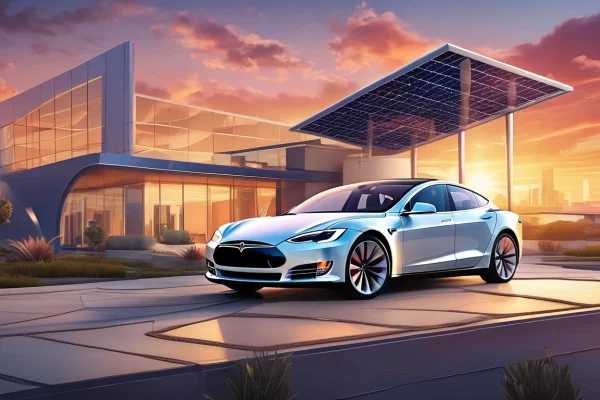The Genius Behind Tesla: Who Inspired Elon Musk?

Elon Musk is a name that sparks curiosity and admiration across the globe. But have you ever wondered who shaped the mind of this visionary? The journey of Musk, from a curious child in South Africa to the CEO of Tesla and SpaceX, is filled with influences that ignited his passion for technology and innovation. His story isn’t just about personal ambition; it’s also a tapestry woven with the threads of inspiration from family, influential figures, and even the realms of science fiction.
From a young age, Musk was surrounded by a family that valued education and creativity. His mother, a model and dietitian, and his father, an electromechanical engineer, instilled in him a sense of curiosity and a desire to explore the unknown. This nurturing environment played a pivotal role in sparking Musk’s interest in technology. He was the kind of kid who would take apart his toys just to see how they worked, a habit that would eventually lead him to create groundbreaking technologies.
As Musk grew older, he found inspiration in the works of various thinkers and innovators. Figures like Steve Jobs became pivotal in shaping his approach to business. Jobs’ relentless pursuit of perfection and innovation resonated deeply with Musk, pushing him to challenge the status quo in the automotive industry. Musk admired Jobs’ ability to create products that were not only functional but also aesthetically pleasing, a principle he adopted in the design of Tesla vehicles.
Moreover, Musk’s love for science fiction has fueled his imagination and ambitions. The worlds created by authors like Isaac Asimov and films such as “Star Wars” have not only entertained him but have also inspired his vision for the future—one where humanity thrives on other planets and harnesses advanced technologies. This blend of real-world influences and imaginative storytelling has crafted a unique perspective that drives Musk’s innovative endeavors.
In essence, the genius behind Tesla is not solely Musk’s own; it’s a culmination of influences that have shaped his vision and ambitions. From his formative years to the iconic figures he admires, each element has played a crucial role in propelling him toward his extraordinary achievements.

The Early Influences
Elon Musk’s journey to becoming a tech titan didn’t happen overnight; it was shaped by a tapestry of early influences that ignited his passion for innovation. Growing up in Pretoria, South Africa, Musk was surrounded by a family that valued education and creativity. His father, Errol Musk, was an electromechanical engineer, and his mother, Maye Musk, was a model and dietitian. This blend of technical prowess and artistic flair created a fertile ground for young Elon’s imagination to flourish.
From a young age, Musk was an avid reader, often losing himself in the pages of science fiction novels. Authors like Isaac Asimov and Douglas Adams didn’t just entertain him; they sparked a fire in his mind about the possibilities of technology and the future of humanity. This early exposure to imaginative worlds instilled in him a belief that the sky was not the limit but merely the beginning. It’s fascinating to think how a child’s curiosity can evolve into groundbreaking ideas that challenge the status quo.
Furthermore, Musk’s experiences with bullying during his childhood played a pivotal role in shaping his resilience. Instead of allowing these challenges to deter him, he used them as fuel to drive his ambitions. He often reflects on how these experiences taught him the importance of perseverance and the value of standing out from the crowd. In a way, his early struggles were like the steel being forged in fire—strengthened and refined through adversity.
In addition to personal experiences, Musk was influenced by the technological landscape around him. The rise of personal computers in the 1980s caught his attention and ignited his interest in software development. By the age of 12, he had already created and sold a video game called Blastar, showcasing his entrepreneurial spirit at such a young age. This early venture was just a glimpse of the innovative mindset that would later revolutionize industries.
In summary, Musk’s early influences were a mix of family values, literary inspirations, personal challenges, and technological curiosity. Each of these elements contributed to the unique individual we know today—a visionary who isn’t afraid to dream big and push the boundaries of what’s possible.

Inspirational Figures
Throughout his remarkable journey, Elon Musk has been significantly influenced by a diverse array of leaders and thinkers. These have not only shaped his vision but also fueled his relentless ambition to innovate and disrupt traditional industries. Musk’s ability to draw from various sources of inspiration is a testament to his multifaceted approach to business and technology.
One of the most notable influences in Musk’s life is the legendary Steve Jobs. Jobs’ unique approach to design and innovation has left a profound mark on Musk’s philosophy. He admired Jobs’ unwavering commitment to excellence and his belief in creating products that resonate emotionally with consumers. For Musk, the idea that technology should not only function well but also evoke an emotional response is a guiding principle in his work at Tesla and SpaceX.
Moreover, Jobs’ emphasis on innovation and disruption aligns perfectly with Musk’s own aspirations. Just as Jobs challenged the status quo in the tech world, Musk seeks to redefine the automotive and space industries. By adopting similar strategies, Musk has successfully positioned Tesla as a leader in electric vehicles, pushing boundaries and transforming perceptions of what is possible in transportation.
In addition to Jobs, Musk has also drawn inspiration from the realm of science fiction. Authors and filmmakers have painted vivid pictures of the future, sparking Musk’s imagination and shaping his vision for humanity’s technological advancement. Works of science fiction have encouraged him to think beyond the limitations of today and dream of a future where humans are a multi-planetary species.
These influences demonstrate that Musk’s journey is not merely a product of his own intellect but also a tapestry woven from the ideas and philosophies of those who came before him. By embracing the lessons learned from these inspirational figures, Musk continues to carve out a path that challenges norms and inspires others to think big.
Steve Jobs’ Impact
When you think about innovation, the name Steve Jobs inevitably comes to mind. His unique approach to design and technology has not only transformed Apple but has also left a profound mark on Elon Musk. Musk has openly acknowledged Jobs as one of his key inspirations, particularly when it comes to creating products that are not just functional but also aesthetically pleasing. This is where the magic happens; Musk’s vision for Tesla mirrors Jobs’ philosophy of merging technology with art.
Jobs was a master of storytelling, and Musk has adopted this technique to communicate his vision. For Musk, every Tesla vehicle is more than just a car; it’s a narrative about a sustainable future. By crafting a compelling story around his products, Musk captivates his audience, much like Jobs did with the iPhone. The emphasis on user experience is another area where Musk channels Jobs’ influence. Each Tesla is designed with the driver in mind, ensuring that technology enhances the driving experience rather than complicates it.
Moreover, Jobs’ relentless pursuit of excellence resonates deeply with Musk. Both visionaries share a common trait: they refuse to settle for mediocrity. This drive for perfection is evident in Tesla’s rigorous design and manufacturing processes. Musk has famously stated that he wants to build the best cars in the world, and this ambition aligns perfectly with Jobs’ mantra of “making a dent in the universe.” It’s fascinating to see how Musk applies these principles, not just in product development but also in his overall business strategy.
In essence, the impact of Steve Jobs on Elon Musk is a beautiful intertwining of two innovative minds. From design philosophy to leadership style, the echoes of Jobs’ influence are evident in Musk’s work. As Musk continues to push the boundaries of technology and sustainability, one can’t help but wonder: how much of this is a tribute to the legacy of Steve Jobs?
Innovation and Disruption
When we think about innovation and disruption, Elon Musk’s name often comes to mind as a beacon of change. Much like a pebble thrown into a still pond creates ripples, Musk’s initiatives have sent shockwaves through industries that were once considered untouchable. His approach is not just about creating new technologies; it’s about completely redefining how we think about transportation, energy, and even space travel.
At the core of Musk’s philosophy is the belief that innovation should challenge the status quo. He doesn’t just aim to improve existing products; he seeks to revolutionize entire sectors. For instance, with Tesla, he didn’t merely want to build a better electric car; he envisioned a world where electric vehicles could outperform traditional gas-powered cars in every aspect, from performance to sustainability. This vision has forced established automotive giants to rethink their strategies and invest heavily in electric technology.
Moreover, Musk’s ventures often embody the principle of disruption. Take SpaceX, for example. By drastically reducing the cost of space travel and making it more accessible, Musk has not only disrupted the aerospace industry but has also reignited public interest in space exploration. This is akin to how the internet transformed communication and commerce—Musk’s work is laying the groundwork for a future where space is not just for governments but for everyone.
His relentless pursuit of innovation can be summarized in a few key strategies:
- Embracing Failure: Musk views failures as stepping stones to success, often encouraging his teams to take risks and learn from mistakes.
- Cross-Industry Collaboration: He frequently collaborates with other innovators and companies, understanding that shared knowledge fuels greater advancements.
- Customer-Centric Design: By focusing on user experience, Musk ensures that his products not only meet but exceed customer expectations.
In essence, Elon Musk embodies the spirit of innovation and disruption. His ability to challenge norms and inspire change is a testament to the profound impact one individual can have on the world. As we look to the future, it’s clear that Musk’s influence will continue to drive us toward a more innovative and sustainable society.
Leadership Style
Elon Musk’s is as dynamic as the innovations he champions. Drawing inspiration from Steve Jobs, Musk embodies a blend of creativity and ambition that pushes his teams to achieve remarkable feats. He believes in setting high expectations and challenging the status quo, which fosters an environment where groundbreaking ideas can flourish. This approach can be likened to a conductor leading an orchestra, where every musician plays a vital role in creating a symphony of innovation.
Musk’s management techniques often emphasize the following principles:
- Hands-On Involvement: Unlike traditional leaders who may delegate tasks, Musk is known for diving deep into projects. He immerses himself in the details, ensuring that every aspect aligns with his vision.
- Encouragement of Risk-Taking: He promotes a culture where failure is viewed as a stepping stone to success. This encourages his teams to take bold risks, knowing that innovation often comes from experimentation.
- Flat Organizational Structure: Musk favors a less hierarchical setup, which allows for open communication and swift decision-making. This structure empowers employees to voice their ideas and contribute to the company’s direction.
Moreover, Musk’s leadership is characterized by an unwavering commitment to his mission. He often communicates a clear vision of the future, inspiring his teams to work towards ambitious goals. This ability to rally people around a common purpose is crucial, especially in industries that are constantly evolving. Just as a lighthouse guides ships through treacherous waters, Musk’s vision serves as a beacon for his employees, directing them toward innovative solutions and groundbreaking advancements.
In summary, Musk’s leadership style is a potent mix of inspiration, hands-on involvement, and a commitment to innovation. By fostering a culture that embraces risk and encourages creativity, he not only drives Tesla’s success but also sets a powerful example for leaders in all industries.
Influence of Science Fiction
Elon Musk’s vision for the future is deeply intertwined with his lifelong love for science fiction. This genre has not only entertained him but has also served as a wellspring of inspiration, fueling his ambitions in technology and space exploration. From a young age, Musk was captivated by the imaginative worlds and futuristic concepts presented in books and films. These narratives sparked his curiosity about what was possible and pushed him to dream beyond the conventional limits of reality.
One of the most significant influences on Musk is the work of authors like Isaac Asimov and Arthur C. Clarke. Their stories often explore themes of advanced technology and the human condition, prompting readers to consider the ethical implications of innovation. For Musk, these themes resonate with his mission to create a sustainable future on Earth and to make life multi-planetary. He has often cited Asimov’s Foundation series as a pivotal influence, which emphasizes the importance of knowledge and foresight in shaping society.
Moreover, films such as Blade Runner and The Martian have also played a role in shaping Musk’s outlook. These movies not only entertain but also provoke thought about the future of humanity and the potential for interstellar travel. Musk’s own ventures, like SpaceX, echo the adventurous spirit found in these stories, as he aims to make human colonization of Mars a reality. The excitement and challenges depicted in science fiction have inspired him to tackle seemingly impossible tasks, driving him to innovate relentlessly.
In essence, the influence of science fiction on Musk is profound. It has provided a framework for his aspirations and a lens through which he views the potential of technology. By blending the imaginative with the practical, Musk continues to push the boundaries of what we believe is achievable, transforming his science fiction dreams into tangible realities.

Philosophical Inspirations
Elon Musk’s vision is not just a product of technological innovation; it is deeply rooted in a rich tapestry of philosophical ideas that guide his approach to business and life. Musk has often been influenced by various thinkers and philosophies, each contributing to his unique worldview. This blend of philosophy and entrepreneurship fuels his relentless pursuit of groundbreaking advancements.
One of the most significant influences on Musk is the philosophy of Objectivism, articulated by the renowned author and thinker Ayn Rand. Rand’s emphasis on individualism and capitalism resonates with Musk’s entrepreneurial spirit. He embodies the belief that personal achievement and innovation are paramount, often viewing challenges as opportunities to excel. This philosophy encourages Musk to take bold risks, believing that the potential for success outweighs the fear of failure.
Moreover, Musk’s decision-making process often reflects utilitarian principles. He prioritizes actions that yield the greatest overall benefit, embodying the idea that technology should serve humanity. For instance, when developing electric vehicles or space exploration projects, Musk considers not just the financial implications but also the broader impact on society and the environment. This commitment to improving humanity through technology is a hallmark of his ventures.
To further illustrate Musk’s philosophical inspirations, consider the following key ideas:
- Individualism: The belief in personal responsibility and the power of one’s own choices.
- Capitalism: The idea that free markets drive innovation and prosperity.
- Utilitarianism: The ethical approach of maximizing overall happiness and minimizing suffering.
In conclusion, Musk’s philosophical inspirations are not mere abstractions; they are the driving forces behind his ambitious projects. By integrating these ideas into his business practices, he not only challenges the status quo but also inspires a new generation of innovators to think critically about the future of technology and its role in society.
Ayn Rand’s Objectivism
Ayn Rand’s philosophy of Objectivism has profoundly shaped Elon Musk’s worldview and his approach to business. At its core, Objectivism emphasizes the importance of reason, individualism, and capitalism, all of which resonate deeply with Musk’s entrepreneurial spirit. Musk, a self-proclaimed admirer of Rand, often reflects her principles in his decision-making processes and business strategies.
One of the fundamental tenets of Objectivism is the belief in rational self-interest. This idea suggests that individuals should act in ways that promote their own happiness and success. For Musk, this translates into a relentless pursuit of innovation and excellence. He believes that by focusing on creating groundbreaking technologies, he not only furthers his own goals but also contributes to the betterment of society as a whole.
Moreover, Rand’s advocacy for capitalism as a system that rewards hard work and ingenuity aligns perfectly with Musk’s ventures. He often argues that a free market encourages competition and drives progress, which is crucial for tackling global challenges such as climate change and space exploration. In Musk’s eyes, the ability to innovate and disrupt industries is not just a business strategy; it is a moral imperative.
Additionally, Musk’s approach to leadership embodies Rand’s ideas about individualism. He promotes a culture where creativity and ambition thrive, allowing his teams to take risks and pursue bold ideas without fear of failure. This environment fosters a sense of ownership among employees, encouraging them to think independently and contribute to the larger vision of the company.
In summary, Ayn Rand’s Objectivism has significantly influenced Elon Musk’s philosophy and business practices. By embracing her principles, Musk has crafted a unique approach that prioritizes innovation, individualism, and a commitment to improving humanity through technology. It’s no wonder that his ventures continue to push the boundaries of what’s possible, as he strives to create a better future for all.
Utilitarianism in Decision Making
Elon Musk’s decision-making process is heavily influenced by utilitarian principles, which prioritize actions that yield the greatest good for the greatest number. This approach is evident in his ventures, where he consistently evaluates the impact of his decisions not just on profits, but on society as a whole. For Musk, it’s not merely about creating innovative products; it’s about ensuring those products contribute positively to humanity. Think about it: when you’re aiming to revolutionize industries like automotive and space, the stakes are incredibly high. Every choice can lead to groundbreaking advancements or potential setbacks.
In practice, Musk often weighs the long-term benefits against immediate challenges. For instance, consider Tesla’s mission to accelerate the world’s transition to sustainable energy. This vision isn’t just about selling electric cars; it’s about combating climate change and reducing our reliance on fossil fuels. Musk believes that the broader impact of his work can lead to a healthier planet, which aligns with utilitarian ideals.
Moreover, Musk’s commitment to improving humanity extends beyond his companies. He actively engages in projects like Neuralink, which aims to enhance human capabilities and address neurological diseases. By focusing on the potential benefits for society, Musk embodies the utilitarian mindset, often asking himself, “How can this make the world a better place?”
To illustrate how Musk applies utilitarianism in decision-making, let’s break down some key aspects:
- Long-term vision: Musk consistently looks beyond immediate profits, focusing on sustainable solutions.
- Risk assessment: He evaluates the potential risks and rewards of each decision, prioritizing those that offer the most significant societal benefits.
- Innovative thinking: Musk encourages his teams to think creatively about how their work can improve lives, fostering a culture of innovation.
Ultimately, Musk’s utilitarian approach not only drives his business strategies but also inspires others in the tech and automotive industries to consider the broader implications of their innovations. By prioritizing the greater good, he sets a powerful example of how business leaders can align their goals with the welfare of society.
Frequently Asked Questions
- Who are the key figures that inspired Elon Musk?
Elon Musk has drawn inspiration from various influential figures, including Steve Jobs, whose design philosophy and innovative spirit significantly impacted Musk’s approach to technology and product development.
- How did Steve Jobs influence Musk’s leadership style?
Musk’s leadership style mirrors Jobs’ principles, focusing on fostering creativity and ambition within teams. This approach encourages innovation and challenges traditional norms, much like Jobs did at Apple.
- What role does science fiction play in Musk’s vision?
Musk’s fascination with science fiction has shaped his ambitious ideas about the future, especially regarding technology and space exploration. Authors and films in this genre have fueled his imagination and vision for humanity’s future.
- How does Ayn Rand’s philosophy affect Musk’s business practices?
Ayn Rand’s Objectivism, which emphasizes individualism and capitalism, resonates with Musk’s entrepreneurial mindset. This philosophy underpins many of his business decisions and strategies.
- What is Musk’s approach to decision-making?
Musk often employs utilitarian principles in his decision-making, prioritizing actions that maximize overall benefits. This reflects his commitment to advancing humanity through innovative technology.





